This article may contain affiliate links, and I will be compensated if you make a purchase after clicking on my links (at no additional cost to you)
The better food that you put in your pitbull, the healthier and more efficient their body will be and the more energy they will have. Better food also promotes healthy growth and development in puppies, as well as a shiny, soft hair coat, a healthy weight, and less waste.
If only choosing a high quality dog food was as easy as we would all like it to be, there are hundreds of brands and formulations of dog food. Which one is right for your dog?
We’re here to help you find the best dog food for pitbulls so that your furry friend will be happy and healthy for as long as possible.
Best Dry Dog Food for Pitbulls
Dry dog foods not only provide a nutritional punch with the decreased worry of spoiled food, they also help keep your pitbull’s teeth and gums healthy.
If you’re looking for a more convenient way of feeding your pitbull, here are some of the best dry dog foods available.
Merrick Backcountry Freeze Dried Raw Great Plain Red Recipe
A unique high protein option for your pitbull is this dog food from Merrick.
It features high quality kibble mixed with pieces of raw freeze-dried real meat to make a protein content of 38%.
That’s enough to fuel even the most active dog and promote healthy and strong muscle maintenance.
Your dog will get the benefit of a raw diet without the hassle and worry of spoilage and bacterial contamination.
Not only is this food high in protein, it’s high in quality protein from whole beef.
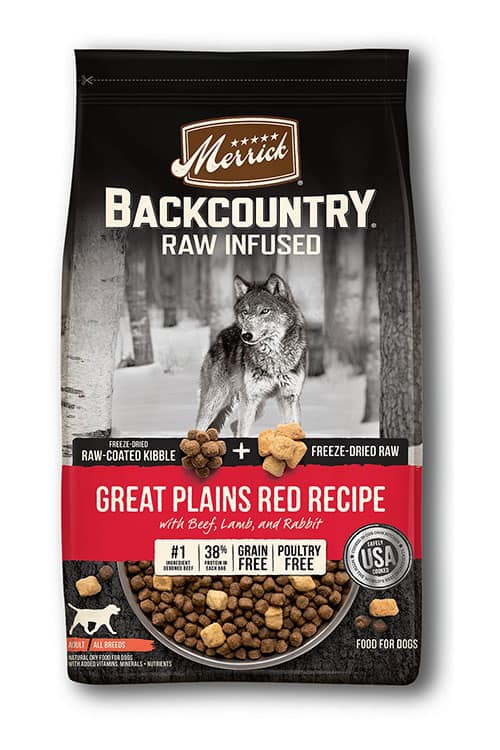
Blue Buffalo Wilderness Chicken Recipe Grain-Free Dry Dog Food
With the first ingredient being whole chicken, you know what your pitbull’s protein requirements will be met.
In fact, this food contains 34% protein and 15% fat, enough to keep your pitbull energized for all of the activities that you have in store.
It is also grain-free should your dog require this type of diet due to allergies or sensitivities.
This food also provides glucosamine for healthy joints and comes in other flavors like salmon, duck, and red meat.
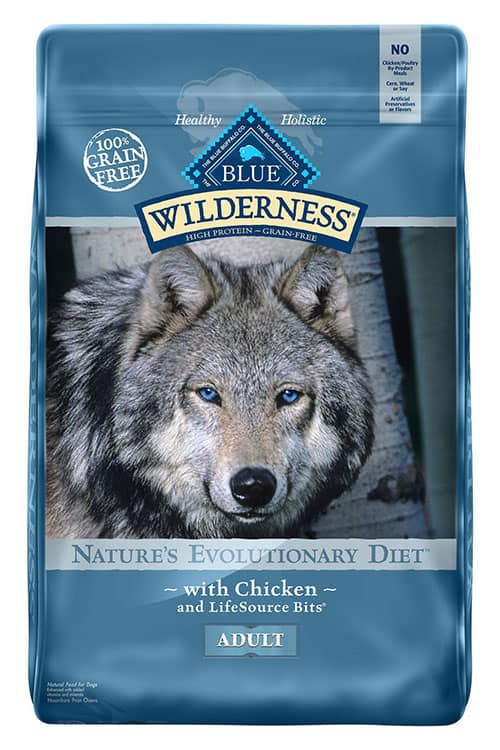
Taste of the Wild Ancient Prairie with Ancient Grains Dry Dog Food
For a different flavor approach, Taste of the Wild uses whole buffalo and pork as its main sources of protein.
Not only are these meats highly nutritious, they may work well for a pit bull in search of a novel protein diet due to food allergies.
This food brings 32% protein to the food bowl as well as the nutrient dense benefits of ancient grains like quinoa and sorghum for a complete and balanced diet.
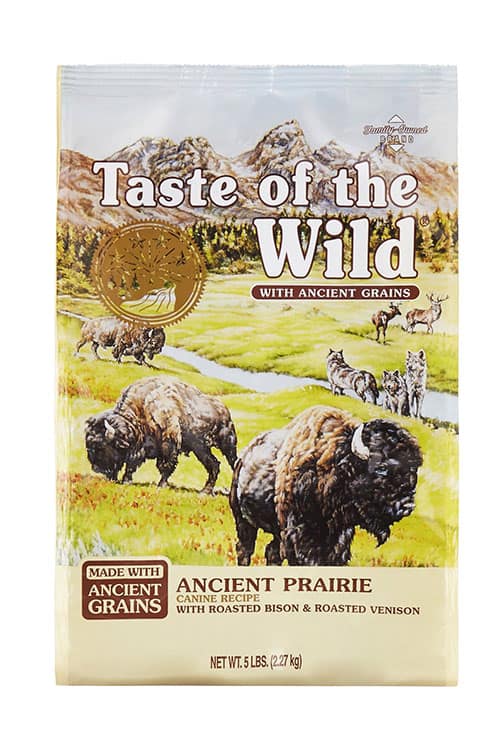
Wellness CORE Grain-Free Original Dry Dog Food
For another whole meat option, Wellness CORE provides 34% protein and 16% fat with no grains in order to promote muscle growth and maintenance.
It also contains glucosamine, probiotics, and antioxidants to promote the overall health and wellness of your bully.
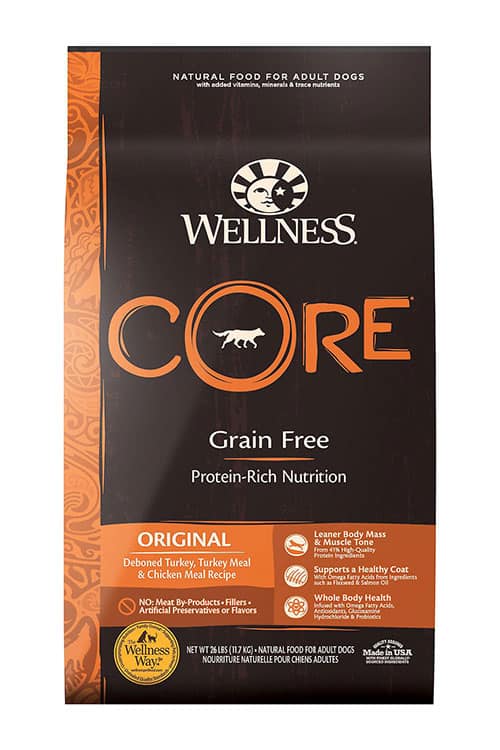
Annamaet Ultra 32% Dry Dog Food
With multiple protein sources consisting of chicken, fish, and eggs, Annamaet Ultra provides 32% protein and 20% fat to keep the most active dogs in shape.
It uses chicken meal instead of whole chicken, which knocks it down a notch, but it is still a highly nutritious food for active pitbulls.
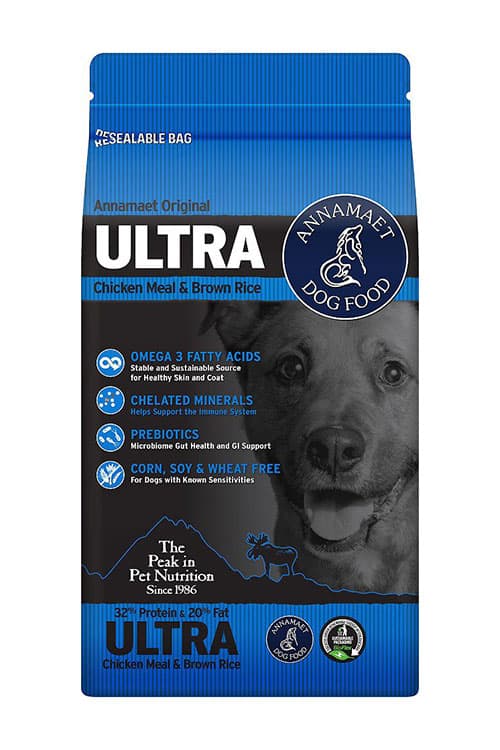
Bully Max High Performance Super Premium Dog Food
A very high calorie food that’s also high in protein, Bully Max will fuel your pitbull through any activity and then some.
This meat based brand is very forward about what they put in their product, with no ‘hidden ingredients’ and consider themselves the muscle builders of the dog food world.
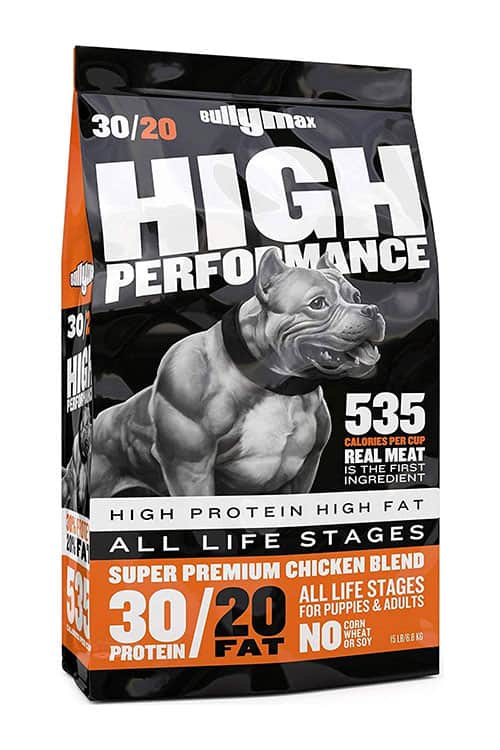
Gorilla Max 31/25 Ultra Performance Dog Food
An even more calorie dense food is Gorilla Max Ultra Performance Dog Food.
This food is made for dogs that are on the go all day long.
It is formulated to build muscle mass while feeding smaller amounts than any other dog food, a great way to extend your dollar as well as your dog’s food.
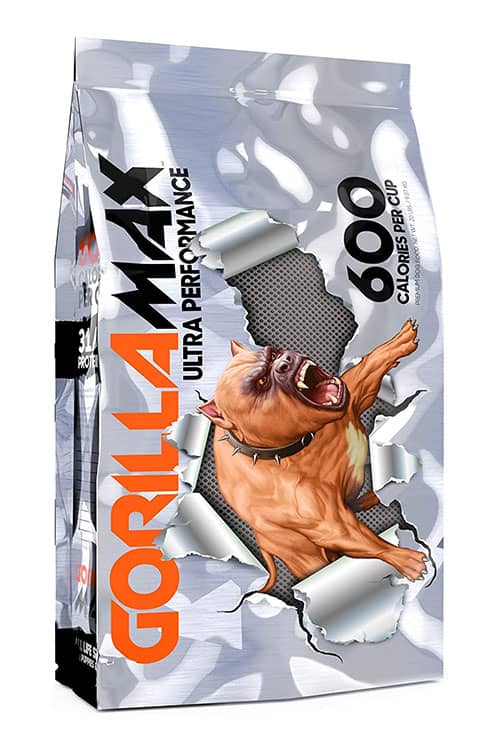
Best Wet Dog Food for Pitbulls
Wet dog foods are great at providing quality ingredients and lots of moisture in a dog’s diet, and they tend to be a bit higher in protein.
They also make a tasty treat that some dogs prefer over crunching dry kibble.
Wet dog food, once opened, will spoil more quickly than kibble and it doesn’t have the teeth cleaning benefits, so some pitbull parents may choose to feed it as a mix-in rather than the sole food source. Some of the best wet dog foods for pitbulls are as follows:
Blue Buffalo Wilderness Turkey & Chicken Grill Grain-Free Canned Dog Food
Lots of meaty goodness awaits your pitbull in every can of Blue Buffalo Wilderness dog food. Its 45% protein comes from whole meats like turkey and chicken to promote healthy muscle growth and maintenance.
With no grains or artificial flavors or preservatives, you can be sure your pup is receiving the best nutrition to keep them healthy.
There are also other flavors, like Beef & Chicken and Salmon & Chicken if your dog prefers a little variety in their food bowl.
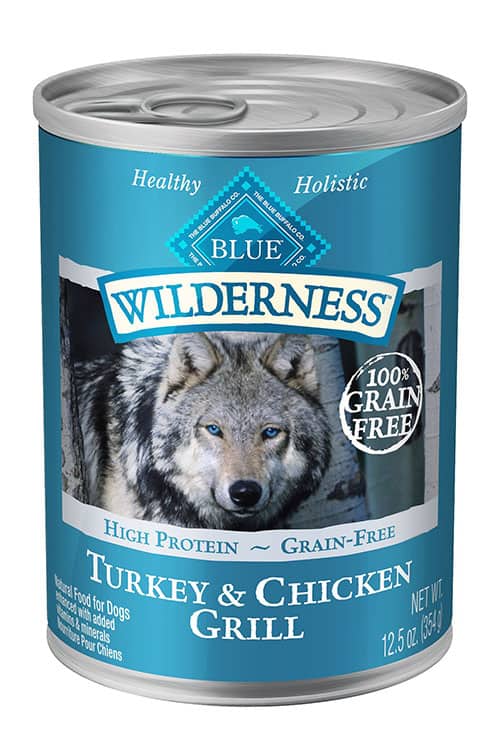
Purina Beyond Wild Prey-Inspired Grain-Free High Protein Beef, Liver and Lamb Recipe
Purina Beyond uses real beef as the main protein source but with the added benefits of nutrient dense organ meats to more closely pattern a dog’s diet in the wild.
This canned food is high in protein, at around 40%, to promote lean muscle growth without added calories and without any grains in case your dog has an allergy.
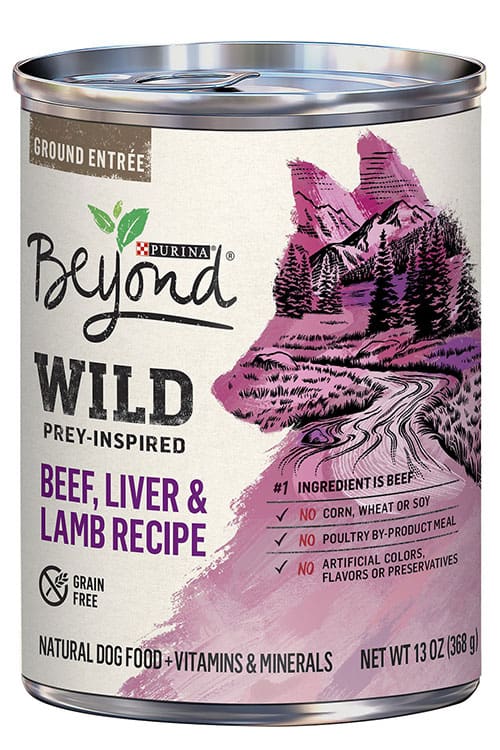
Wellness Ninety-Five Percent Chicken Grain-Free Canned Dog Food Topper
While this isn’t a stand alone wet dog food, it does provide a protein boost to any dry or wet dog food.
Wellness Ninety-Five Percent Chicken is that and only that-chicken.
It also makes a healthy reward after a training sessioin or just a flavorful mix-in whenever you feel like treating your dog.
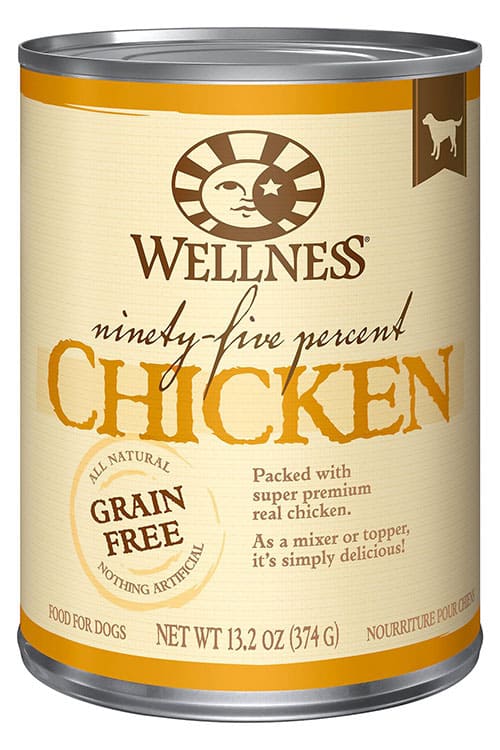
Are Homemade Diets Good for Pitbulls?
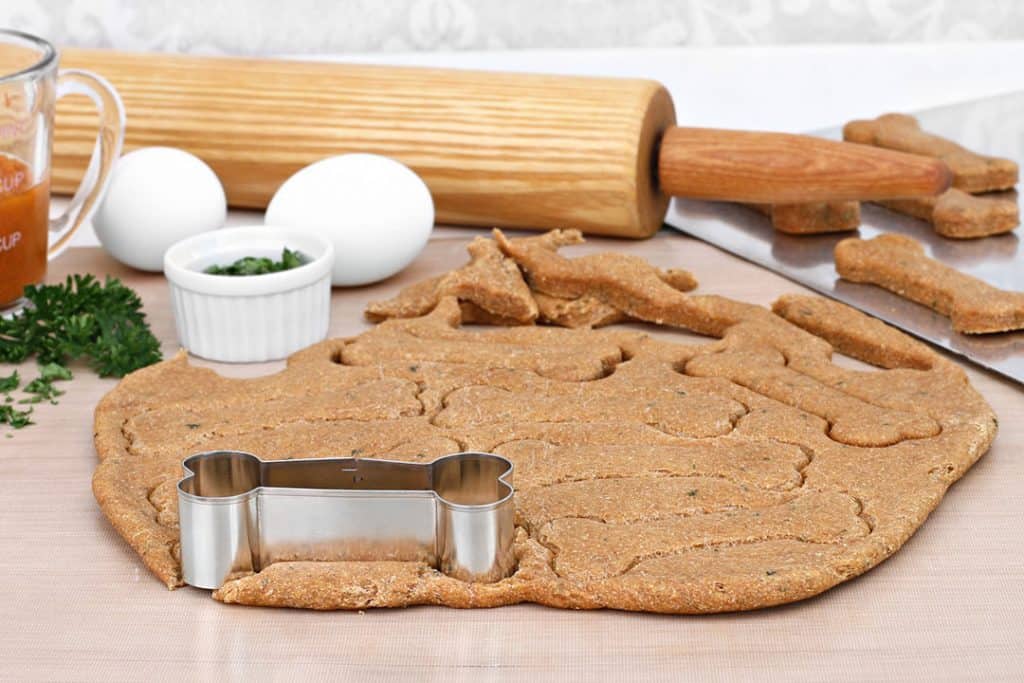
With recent recalls of commercial dog foods due to unsafe ingredients, many pitbull parents may be interested in homemade diets to fortify their best friends.
This is a valid concern and another great reason to choose a high-quality brand that is upfront about where they source their ingredients from.
If cooking for your dog piques your interest, proceed with caution. Homemade diets can be wonderful creations, assuming that they are complete and balanced.
You may decide that feeding your dog from the table will cover all of their nutritional bases, but guess what? Dogs have different nutritional requirements than humans do and this type of diet could be too high in fat and other unnecessary nutrients.
Rather, you need to do your research.
Consult with your veterinarian, preferably one that specializes in nutrition in order to work up a homemade diet plan. You wouldn’t want to create a diet that’s fresh and tasty but lacking in some essential nutrients.
Time can also be a concern with homemade dog foods. If you feel stretched already, cooking for your dog might not be the best route.
Homemade diets can be prepared ahead of time and frozen, but they still require that preparation that commercial dog food doesn’t, and your dog may not benefit from a start and stop style of feeding where you’re constantly switching up their diet, possibly causing digestive upset like vomiting and diarrhea.
How To Pick The Right Canine Food
If you’re still wading through those hundreds of dog food brands to find the perfect option, here’s a few guidelines to help narrow down your search into easier to chew proportions.
Ingredients
First of all, it’s important to know that all commercial dog food that meets the Association of American Feed Control Officials, AAFCO, standards is considered complete and balanced for healthy dogs in the life stage that it is labeled for. So, the first thing you should look for is that AAFCO stamp.
Other than meeting these standards, not all dog food is created equal.
Knowing what to look for on a dog food label will help you pin point precise nutrition for your pitbull in the price range that you can afford.
Again, these standards assume a generally healthy dog with no additional nutritional requirements, so talk with your veterinarian about the specific needs of a pitbull to further customize your dog food search.
The ingredients of a dog food will tell you more about the quality than the guaranteed analysis. You want to choose a dog food that contains ingredients that you recognize-whole food products such as meats and vegetables-and fewer items with names that you can’t pronounce.
Whole products are easier to digest, and will therefore provide your pitbull with more bang for your buck. Meat by-products and meat meals are another great source of nutrients.
You may have a preconceived picture of meat by-products as being teeth and fingernails, but in fact these are the blood and organ tissues that are still highly digestible and full of great nutrition.
If you can’t find a food based solely on whole meats, look for one with whole meats and meat by-products or meat meals.
The ingredients in dog food are listed with the most abundant ingredient first, based on weight. With this in mind, look for a food that lists a protein as the first, preferably first several, ingredients.
Next should come carbohydrate sources, such as grains or potatoes, or if grain-free, fruits and vegetables.
Most dog foods will also contain some additional vitamin and mineral supplements, as well as preservatives to keep it from spoiling.
Nutritional Requirements of Pit Bulls
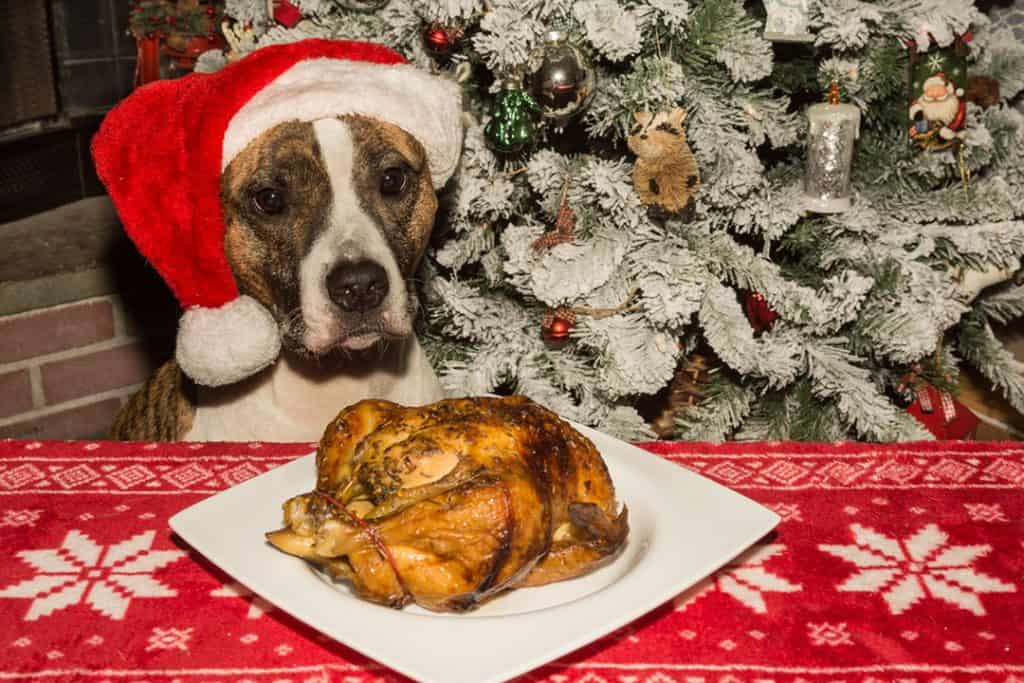
All dogs require six main nutrients to thrive: protein, fat, carbohydrates, vitamins, minerals, and water. With the exception of water, the dog food that you choose should provide all of the necessary nutrition. You shouldn’t need to supplement your pitbull in order to provide a complete and balanced diet.
To help you out, dog food labels will also give you the guaranteed analysis of the diet.
This is a measurement of the amount of nutrients that are available in the food and are given as a percentage of total diet.
Checking the guaranteed analysis will help you decide if it meets the requirements for your pitbull. It’s important to know that these percentages are given on an as-fed basis meaning that they take water into account.
If you truly want to compare the nutritional content between different foods, you need to convert it to a dry matter basis by taking out the water content.
This can be done by subtracting the percent moisture from 100. Then divide the percent of the nutrient you are looking at by the percent dry matter.
For example: a dry food is 12% moisture. 100-12=88% dry matter. The protein percentage is 23. Divide that by 88 to get percent protein on a dry matter basis. 23/88=26% protein.
This is especially important when comparing dry dog foods to wet ones as wet foods have a much higher moisture content and as-fed nutrient contents will appear much lower than those in dry foods.
So, why do you need to compare?
While AAFCO assures that all dog foods that meet their standards are complete and balanced, some pitbulls may require a little extra nutrition than the average healthy adult dog.
Protein
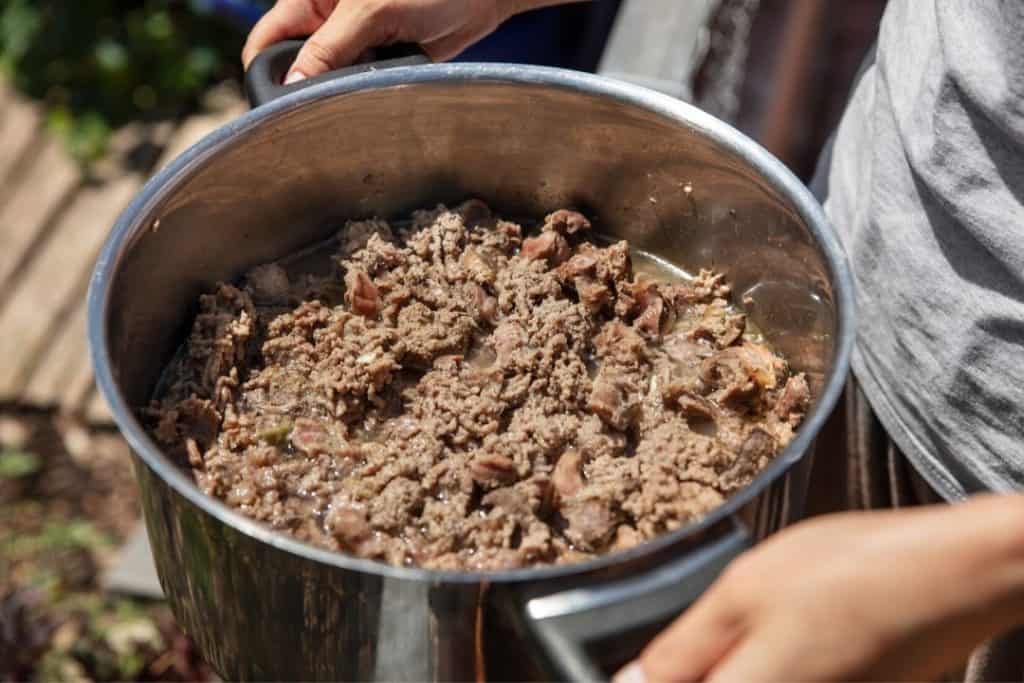
Proteins are an important source of energy for a pitbull, as well as the source of amino acids which are used to produce hormones, digestive enzymes, and are an important component of a dog’s metabolism.
Dogs require 22 different amino acids to perform all of these functions, with 12 being made by the liver and 10 needing to come from the diet.
No single protein source can supply all of these 10 amino acids, so it’s important that your pitbull gets protein from a variety of sources.
Also, protein from animal sources tends to be more digestible for dogs, so, again, their main protein sources should come from a variety of whole meats rather than plants.
AAFCO suggests that dog foods contain at least 18% protein. However, pitbulls, due to their muscle mass and activity levels, should receive more like 25-35% with the really active pups getting more on the 40% protein level.
Fat
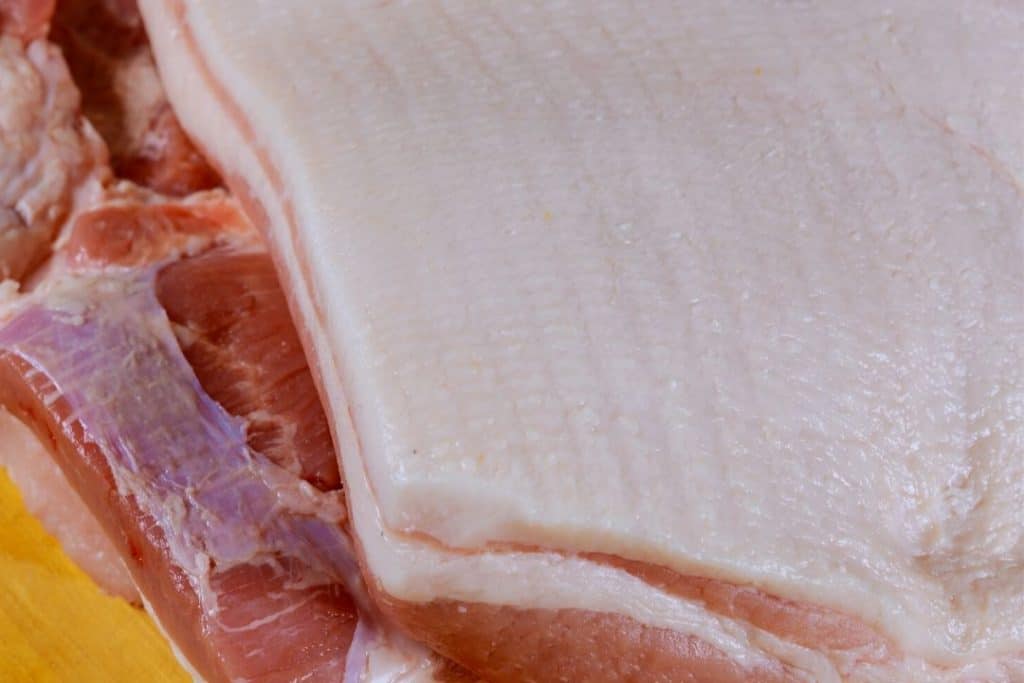
While most people look down upon fats as those nasty things that create a ‘spare tire’ around our dog’s middle, fats are actually extremely important to every part of your dog’s body. Fats make up the cellular barrier for every cell in every organ in the body.
It’s fats that ensure bodily functions continue as normal. Fats also are necessary for absorbing and storing certain vitamins and for the development of the nervous system.
Fats are a significant source of energy as well.
However, we’re all aware of the detrimental side of too much fat in a dog’s diet, so it’s important to find that perfect balance.
AAFCO standards require dog food to contain at least 5% fat, but a pitbull should consume more like 20% fat per day, again due to their activity level.
Carbohydrates
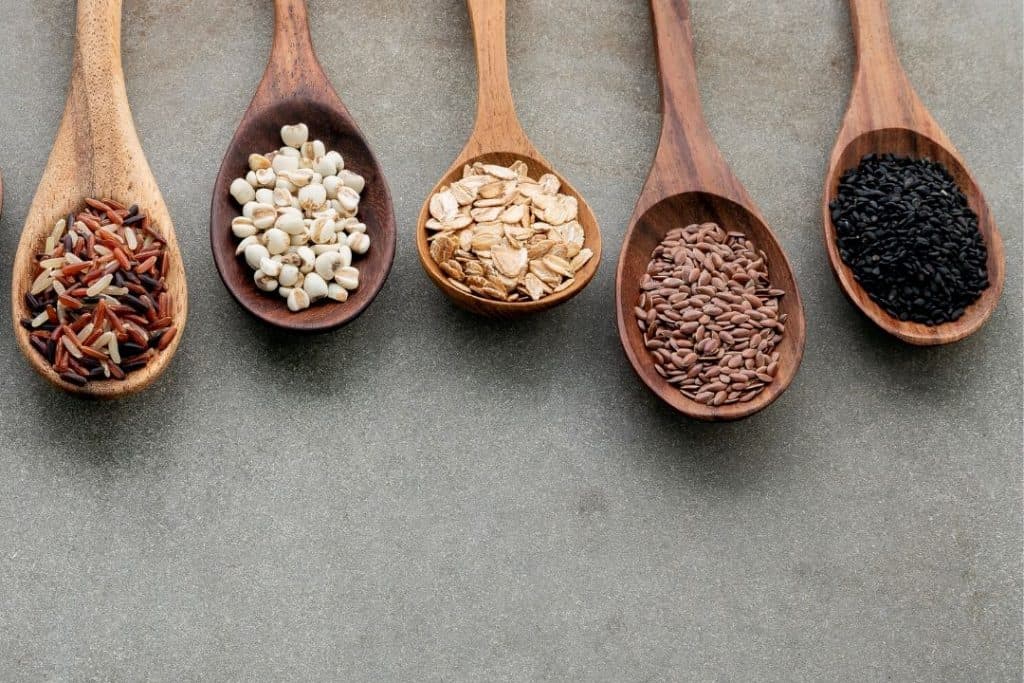
There are a couple types of carbohydrates, soluble and insoluble. Soluble carbs are the type that create quick energy.
Insoluble are the indigestible fibers that help regulate your dog’s digestive system. The more energetic your pup is, the more soluble carbs they should have.
The more couch potato your dog is, the more insoluble fiber they should have.
Dog foods derive their carbohydrates from fruits, vegetables, and whole grains. As long as your dog doesn’t have an allergy, whole grains are a great source of carbohydrates, amino acids, and vitamins and minerals.
Providing your pitbull with the proper amount of carbohydrates will keep them energized throughout the day without them having to tap into their protein stores (muscles) for energy.
Most pitbulls will do well with around 30% carbs, but this can be adjusted based on weight gain or loss.
Vitamins and minerals
Vitamins and minerals are involved in every function of your dog’s body, from bone growth and repair to oxygen transportation in the blood.
Fortunately, vitamins and minerals are found in nearly every food, including meats and grains as well as fruits and vegetables.
As long as your pitbull’s diet contains a variety of foods from all of the food groups, their vitamin and mineral requirements are more than likely met.
Price and Availability
Once you’ve narrowed down your dog food search and found some brands that meet your pitbull’s nutritional requirements, it’s time to look at it from an angle that only you care about: price and availability.
The best dog food in the world won’t do your pitbull any good if you can’t afford to feed it to them or if you can’t get a new bag when they run out.
Fortunately, there are many high quality dog food brands in every price range, so if you can’t afford your top choice, dig a little deeper and you’ll be able to choose one that will work as well for fewer dollars.
It’s important to remember that high quality dog foods are often fed in smaller amounts since they are more nutrient dense and lack the cheap fillers that lower quality foods contain.
With that in mind, a high quality food may cost more upfront, but feeding less of it equals a lower cost per meal than you might imagine.
As a bonus, more digestible nutrients and fewer fillers also equals less waste, so fewer piles for you to pick up from your yard.
Availability may not seem like a big deal, until you run out of food on a Saturday night and the veterinary clinic is closed.
Choose a food that is available from many different venues so that you have options if you ever get in a need food now kind of pinch.
Vet Recommendations
Finally, use your veterinarian as your main influencer on dog food choices.
While following the AAFCO standards or other guidelines will help you pick a food that is great for healthy dogs in general, your particular pitbull pal may need a little more of this or a little less of that.
Your veterinarian will be able to line out a precise diet for your particular pup so that they get exactly what they need to be fit and healthy without over doing it on things that they don’t need.
For example, protein requirements can be a slippery slope, so it’s best to talk with your veterinarian about how much protein your dog needs.
We just learned that proteins are important for many bodily functions, but too much protein can be hard on the kidneys.
Same goes with fat. Fat is essential for the body, but too much can be life threatening. Carbohydrates, as well, should be adjusted as needed to maintain an energetic pup with a trim waistline.
The list goes on and on.
Your veterinarian knows about nutrition and they know your pitbull, so let them pair the perfect diet to your canine companion.
Conclusion
Trying to find that perfect food for your pitbull can make your head spin.
Hopefully this guide will help you take some of the guesswork out of choosing a diet that not only meets your dog’s nutritional needs but that is also affordable.
Providing proper nutrition is about more than just the now, it helps determine that lifelong healthy and longevity of your pitbull. Know of any other pitbull friendly foods?
Let us know what your dog likes and that provides them with the nutrition that they need to be energetic and strong.

Dr. Chyrle Bonk has been a veterinarian since 2010. When she’s not practicing medicine or writing, she’s spending time with her family in the great outdoors of Idaho or tending to her menagerie of animals.

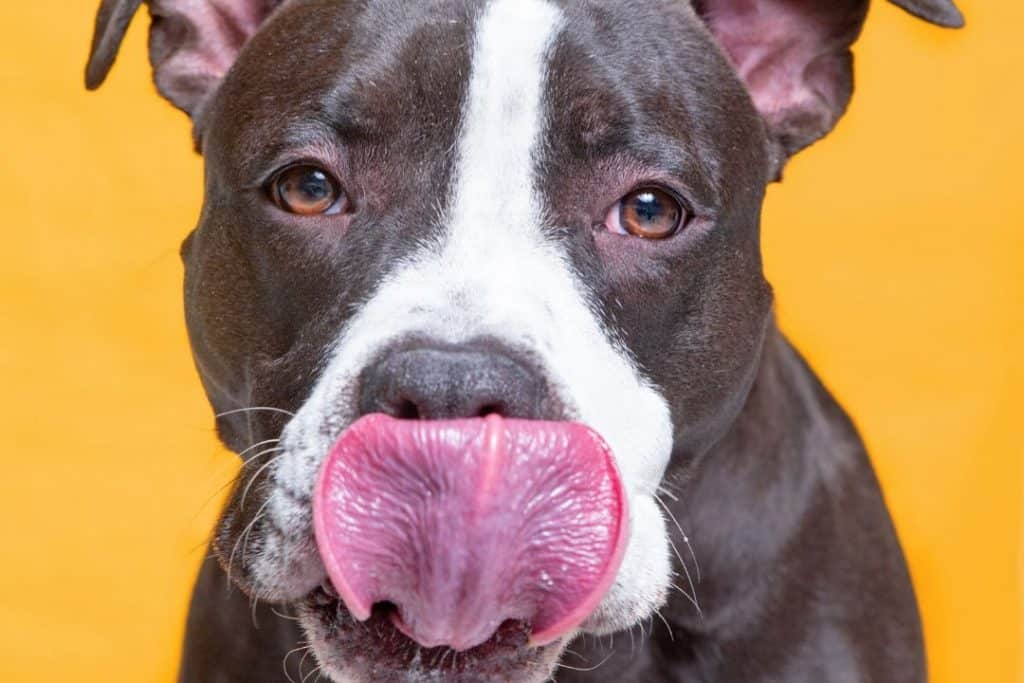
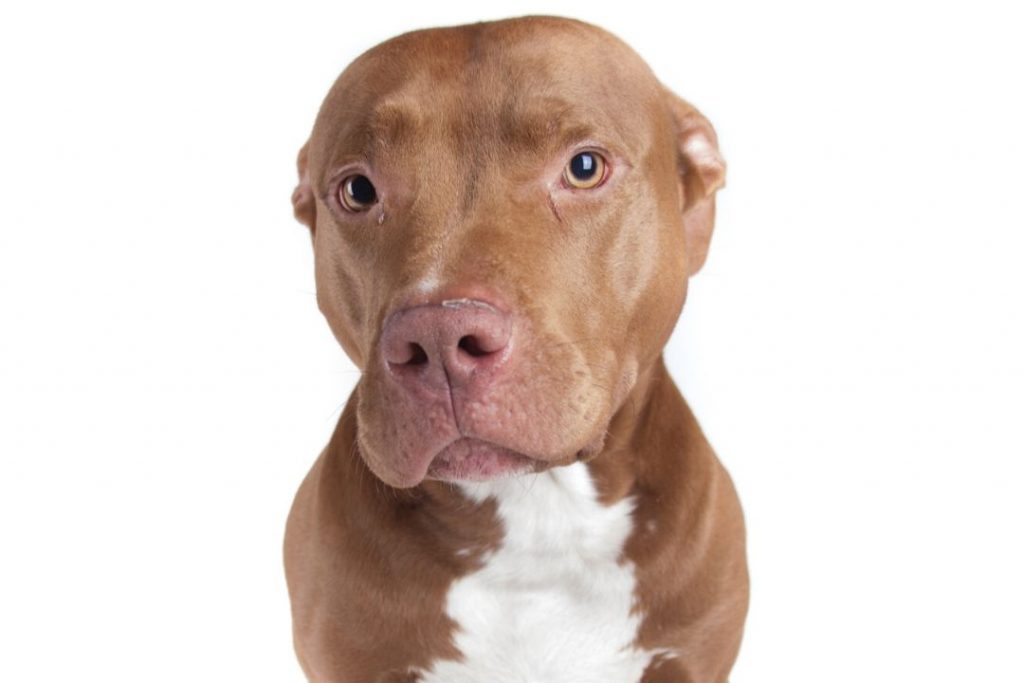
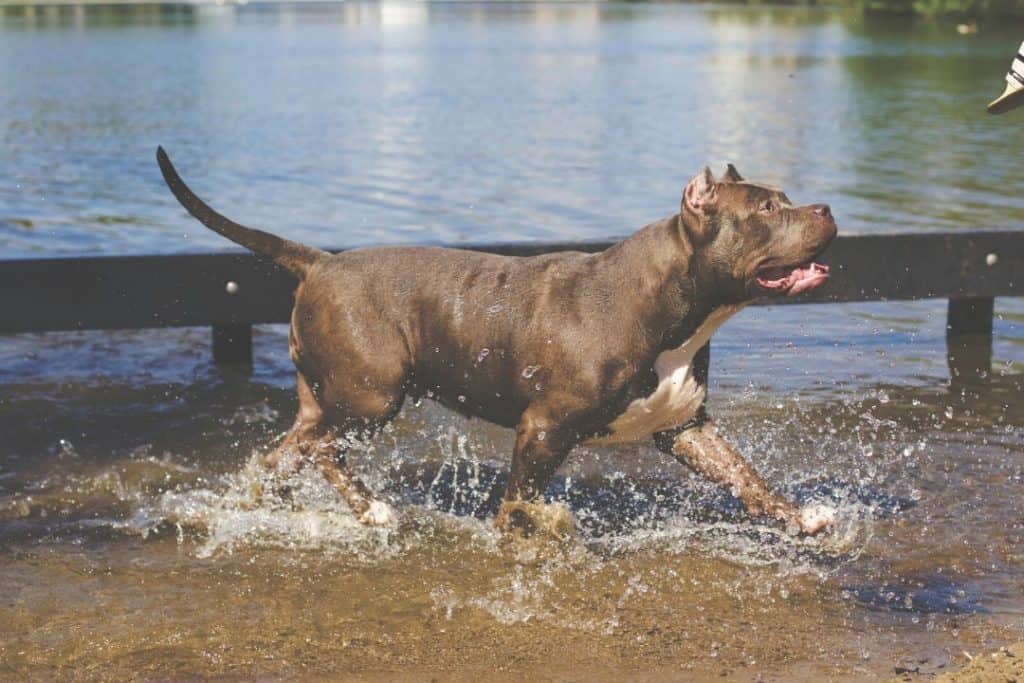
Just trying to find the best wet and dry food for my American Pitbull terrier who is 6 months old I just don’t know what to get I’m reading everything I’m trying to learn what’s best and I just want him to have a healthy body and a nice coat .